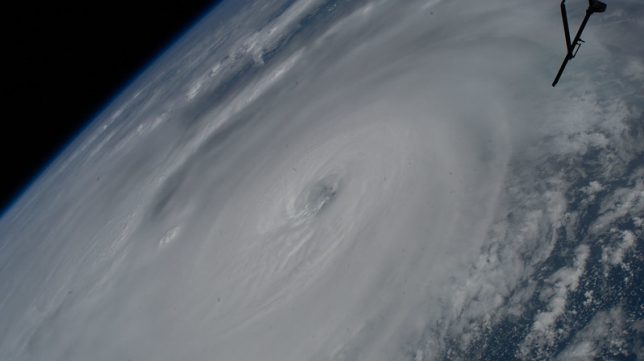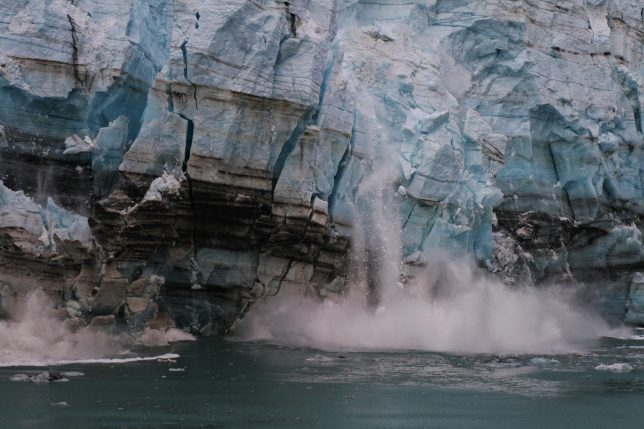
“Climate scientists are citizens and humans too. As citizens, we have our own views of the world and we engage in the public debate in the ways we see fit. As humans, we have the inalienable right to express our opinions in a peaceful manner.”
By Jessica Corbett, Common Dreams
More than 1,500 scientists on Thursday released a letter declaring that they are “appalled by the recent retaliation against colleagues who dared to exercise their civil and human rights” with a peaceful protest at a December conference in Chicago.
Published by news outlets around the world in English, French, and Portuguese, the letter comes after Rose Abramoff and Peter Kalmus unfurled a banner that read “Out of the lab & into the streets” just before an art and science plenary talk at the Fall Meeting of the American Geophysical Union (AGU).
“As scientists, we make detailed observations and carefully design experiments and models to understand the causes, processes, and implications of climate change” the letter states. “We stick to facts and do our best to inform policymakers and fellow citizens, and train students in rigorous scientific methods.”
“Importantly, climate scientists are citizens and humans too,” the letter adds. “As citizens, we have our own views of the world and we engage in the public debate in the ways we see fit. As humans, we have the inalienable right to express our opinions in a peaceful manner.”
Citing scientific conclusions about the causes of the climate emergency and the urgent need to address them, the letter stresses that “more than ever, we need to engage actively as citizens-who-are-scientists in working for the mitigation of greenhouse gas emissions and the swift transition to a low-carbon future.”
#AGU22 is the huge Earth science meeting, with 25,000 scientists. Talks and posters detail the breaking down of our Earth in real time. They are terrifying. So @ultracricket and I stepped outside extremely strong norms and urged scientists to take a stand.pic.twitter.com/qkjQVq8SGh
— Peter Kalmus (@ClimateHuman) December 16, 2022
The AGU—which has over 60,000 members and 23 peer-reviewed journals— describes the annual conference as “the most influential event in the world dedicated to the advancement of Earth and space sciences.” The organization launched a probe into the protest.
While Kalmus still works at NASA’s Jet Propulsion Laboratory, the Oak Ridge National Laboratory, which is sponsored by the U.S. Department of Energy, fired Abramoff over the demonstration, which she wrote about in a New York Times opinion piece earlier this month.
Abramoff and Kalmus—who have both been arrested for previous climate-related civil disobedience—disrupted the AGU event for less than 30 seconds. Someone swiftly ripped the banner from the scientists’ hands and AGU staff escorted them from the stage. Kalmus tweeted that “the AGU took our badges and kicked us out of the meeting.”
HEATED reported Friday that the day before the protest, during a grief circle at the conference that was asked to disperse to clear a hallway, “Abramoff said she gave her phone number to one of the AGU officials. HEATED independently identified this official as the senior vice president of meetings, Lauren Parr.”
The report added that “after being expelled from the conference, Abramoff said she received a phone call from Parr (Abramoff did not name Parr in the conversation with HEATED), in which Parr threatened arrest if the two returned; said their research would be removed from the conference; and that AGU would contact their work institutions.”
Parr declined to comment while an AGU spokesperson declined to confirm those details and “also attempted to prevent HEATED from naming Parr, claiming she had been receiving significant harassment and death threats,” according to the outlet.
"This wasn’t the first-ever protest at AGU, which has welcomed climate action in the past. But it was the 1st time a scientist has been fired as a result of participating in a protest at the conference. We decided to dig into this story…"@ariellesamuel https://t.co/8rlwzpibMB
— Chris Hendel (@chrishendel) January 27, 2023
The new letter—signed by members of the Earth system science community from dozens of countries, including several authors of Intergovernmental Panel on Climate Change reports—charges that “the response with which they were met was by far disproportionate,” calling out both “the AGU’s actions against them and the recent retaliation that followed.”
The letter continues:
We argue that the cost of silence in the face of such unfair and disproportionate treatment, for the scientific community and the planet, would be too high. The heavy-handed and unjust responses to a short banner unfurling not only threatens the careers of two scientists, it also discourages researchers—and especially early-career scientists—from engaging with their colleagues and society and to speak out about the urgent need for climate action. We are deeply concerned by a decision that tells scientists that they risk their careers if they dare speak out or engage in advocacy that is not formally approved. Employers should not punish scientific researchers for participating in nonviolent climate action. Academia and membership organizations like AGU should be safe spaces for freedom of expression.
We stand by our fellow climate scientists who express frustration with the lack of meaningful climate action within the scientific community and the public, who bring attention to the urgency of the moment in a nonviolent manner. We stand by Rose and Peter.
Scientists and others from across the globe have publicly shared similar sentiments since mid-December.
Erika Spanger-Siegfried, director of strategic climate analytics in the Union of Concerned Scientists’ Climate and Energy program, warned last week that “in the absence of a clear endorsement of the objective (not the means) of Abramoff and Kalmus’ actions, AGU’s response, coupled with Abramoff’s firing, may be seen by the scientific community as a strong, disapproving, and chilling signal to scientists to step back from climate activism—just when the world needs them to show up in new, courageous ways.”
An open letter addressed directly to the AGU—so far signed by over 2,000 people—says that “we as scientists cannot and must not tolerate this censorship and chilling lack of support from our scientific society and therefore urge AGU to: i) reinstate the scientific contributions of Rose Abramoff and Peter Kalmus to the program; ii) officially rescind any communications AGU may have had regarding this incident with Rose Abramoff and Peter Kalmus’ former or home institutions until after the AGU professional misconduct investigation has concluded; and iii) immediately close the professional misconduct investigation.”
In response to AGU CEO Randy Fiser’s January 11 statement about the demonstration and subsequent investigation, Aaron Thierry tweeted that such protest “is both necessary and justified,” and pointed to an August paper he published in the journal Nature Climate Change with four other climate scientists and a political scientist who focuses on civil disobedience and social movements.
According to Thierry, rather than sanctioning and investigating Abramoff and Kalmus, the AGU “should be backing them in their efforts!”
This post has been updated with HEATED’s additions clarifying that the news outlet independently identified Lauren Parr and Rose Abramoff did not name the AGU official.


